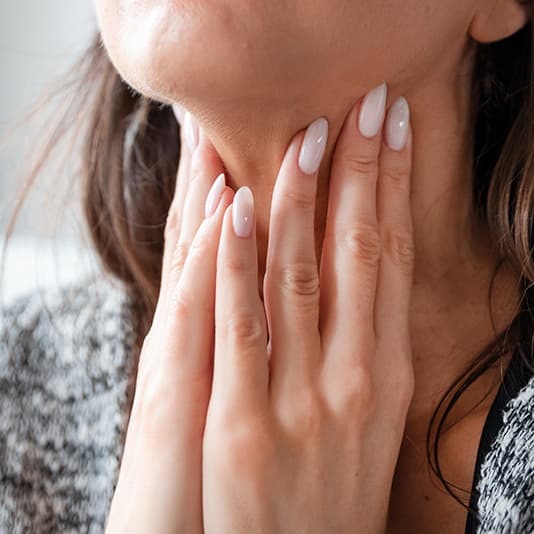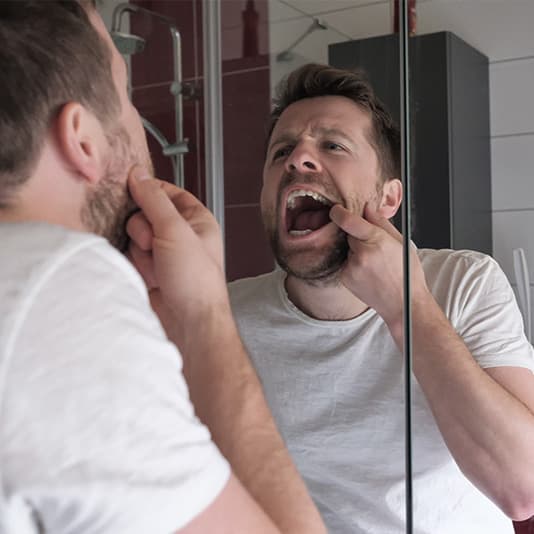Mouth cancer – what you need to know
Blog Article | By Simplyhealth | 2 November 2022
The month of November marks Mouth Cancer Action Month, a charity campaign organised by the Oral Health Foundation which is designed to raise awareness of mouth cancer and highlight key detection and prevention messages. Denplan, part of Simplyhealth, is proud to be the campaigns’ principal sponsor for the 22nd year in row.
In the UK, 8,846 people are diagnosed with mouth cancer each year and sadly cases are on the rise, with mouth cancer having increased by 34% in the last decade and by 103% compared with 20 years ago (England data only).1
Mouth cancer can have a significant impact on your day-to-day life and in some cases, can even be fatal. An estimated 3,034 people in the UK lost their life to mouth cancer last year.1 It can affect anyone, so it is vital that you and your family know what to look out for. In this article, we’ll talk about the signs and symptoms of mouth cancer, as well as lifestyle changes that you can make to help reduce your risk.
What to look out for
Mouth cancer can develop in various areas of your mouth, including your lips, tongue, gums and cheeks. Key signs and symptoms to look out for include:
Ulcers which do not heal within three weeks
Lumps or swellings in your mouth or head and neck area
Red & white patches in the mouth
If something doesn’t seem quite right, don’t delay, contact your dentist or GP straight away.
Step-by-step: how to check for changes in your mouth
Cheeks:
Look out for red, white or dark patches. Put your index finger inside the cheek and your thumb on the outside. Squeeze the cheek to check for any lumps, tenderness or ulcers.
Mouth:
Run your finger on the roof of the mouth to feel for any lumps. Repeat on the floor of the mouth.
Neck:
Feel and press along the front and sides of the neck. Can you feel any lumps?
Head and neck:
Do both sides look the same? Look for any lumps or swellings that are only on one side of the face.
Lips:
Pull down the lower lip and look for any sores or changes in colour. Use your thumb and index finger to feel the lips for lumps or changes in texture.

Who is at risk of mouth cancer?
While anyone can develop mouth cancer, there are some factors that can increase your risk, including2:
If you have had mouth cancer before, you are at greater risk of developing it again.
If you have had oesophagus cancer (of the food pipe), skin, cervical, penile or anal cancer.
If you are undergoing treatment for HIV or AIDS.
If you are taking medication after an organ transplant.
If you have a close relative diagnosed with the disease, there is a slight increase in your risk.
If you have genetic conditions affecting the bone marrow, skin or fingernails.
Around 91% of all mouth cancer diagnoses are linked to lifestyle2 and so while there are further risk factors, the good news is that there are steps that you can take to help reduce your risk.
How you can help to prevent mouth cancer
Stop smoking and using smokeless tobacco
Smoking tobacco increases your risk by up to ten times.2 This includes cigarettes, pipes or cigars. Chewing and smokeless tobacco, such as gutka, betel quid, zarda, snuff and nass are also risk factors.2
Cut down on alcohol
Drinking alcohol to excess is linked to a third of all mouth cancers. Guidelines recommend a maximum of 14 units a week.2
Practice safe sex
The human papillomavirus (HPV), spread through oral sex, is now one of the main causes.2
Too much ultraviolet (UV) radiation is a known cause of skin cancer and can develop on the lips.2
Maintain a healthy, balanced diet
Eating a diet that contains fruits and non-starchy vegetables can help to reduce mouth cancer risk.3/4

If any of the above risk factors and lifestyle choices apply to you, this doesn’t mean that you will develop mouth cancer. It is, however, important to stay cautious by performing regular checks of your mouth at home and keeping to up to date with your dental check-ups.
If you or your family notice a change to your mouth, don’t hesitate to contact your dentist or GP right away.
A helping hand from Simplyhealth
Through our health plans, customers can access our SimplyPlan app which includes a 24/7 online GP service, where GPs are on hand to provide advice and reassurance for any health concern you may have.
To enjoy 24/7 online GP access and much more, get our 1-2-3 Health Plan from £23 a month.
This material may contain links to other websites operated by third parties. It is the responsibility of third parties to ensure such material and websites comply with all relevant laws and regulations. To the maximum extent permissible by law Simplyhealth disclaims all responsibility for such websites.
References
State of Mouth Cancer UK Report 2021/2022
Mouth Cancer Action Month 2022, risk factors poster, The Oral Health Foundation